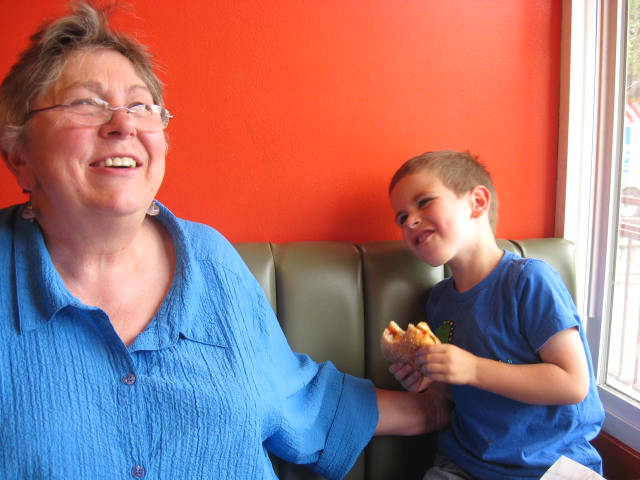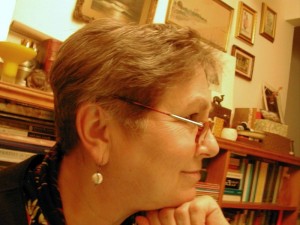Herewith impish, gracile, nimble poems by Contributing Editor (one of our own) Julie Larios whose continuing Undersung series has become a mainstay of the magazine and a model of poetic discourse. Julie’s poems are playful, yes — the body “poor sot” and men! who only need “A belief in the afterlife, or in the theory / that size doesn’t matter” — and her language is fast, packed with snappy rhythms, sly puns and rhymes that twist and curl meaning from word to word. Just read this:
of how the living, soft-bodied, feed at the bottom
of these lists, how we list too often, as in you lean, you lose,
or at the very least or most, moist and semi-soft,
we end up ripened and spread too thin
But prosody aside, she has also a lovely set of themes, always coming back to a view of life, mischievous yet grand, the comedy of the body that won’t stop, that has its knowledge, that faulty and doomed as it is nonetheless is holy, the house of the spirit. And Julie, I think, never loses sight of the current of spirit that runs beneath appearances. Oh, to have written that line.
I love, God says, whatever steers the boat of that bird’s body.
dg
What Body Knows
Body
knows how
to go
slow now,
to fool Doom,
to bow down –
to grow
old.
Body
knows not
how to grow
cool, nor cold,
knows not
how
to stop,
poor sot.
.
What Every Man Needs
A pot to piss in.
A Porsche.
A few pit stops.
And to mark the right spots, several X’s.
Great sex or— on slow nights— a few seeds
to spit off the porch into the dark.
Down any mine shaft, a bright torch.
A daft aunt or two for comic relief.
A belief in the afterlife, or in the theory
that size doesn’t matter.
A mother, ha, like a hole in the head.
A starry sky in the Wild West, a loyal horse.
And to carry him down off his cross, a Blessed Virgin.
On New Year’s Eve, champagne’s satin fizz.
In July, a slow drizzle after the long drought.
In October, sun out after rain.
A magic grain of rice from a folk tale.
A tall tale about the one that got away.
A day on a raft on the Mighty Mississippi,
home-fried catfish and Huck’s Jim for a buddy.
Beauty minus her Beast.
And the best BBQ baby back ribs
this side of Hell or Heaven.
A 7-11 on one corner, a Jiffy Lube on the next.
An exit plan for every war gone wrong.
And after a long day’s work, just a little peace
and quiet, for Christ’s sake, can’t a man get
a little peace and quiet?
.
Proposal for a Whole New Scale
………………—with a nod to David Letterman
Being the new measurement of how things scratch,
that is, what scratches what, which surfaces face
which other surfaces down, as in showdown,
screw-up, or turnover, what marks the softer body
with its harder body by turning over and over,
what breaks last when heated or frozen, relative
to the heart and/or the balls, what clangs the bell
or strikes up the band, what wins hands down
the Grand Prize on the scale opposite the prize
known as Booby, and being also the new measurement
of how the living, soft-bodied, feed at the bottom
of these lists, how we list too often, as in you lean, you lose,
or at the very least or most, moist and semi-soft,
we end up ripened and spread too thin, half-empty
rather than half-full, while sneaking up behind us
and hindering our progress or congress or aiding
our regress are the Straightened, the Leanless,
the Unsnackable and NonSpreading, aka the Moribund,
so tough and tactless, the pins of their blue ribbons
scratch more than our surfaces, then pop
the inflatable lifeboat and we’re surfacing for the first
the second, the last time, trying to breathe which is
an unchangeable characteristic of the living no matter
what scale we draw or weigh in on, including this one,
even when we give the grid a twist, a tweak, or toss in
an extra handful of beans, and even when
we’ve been snookered and when we begin again,
with a new batch of statistics, optimistic as we leave
an inch or two of air at the top, give the whole thing
a new moniker, make it a game called Will It Float?
..
I’m Telling That Story Again
The one where I pull into the driveway
and see a cop car and a hearse and my feet
don’t touch the ground until I’m inside the house
and find out the kids are fine, it’s my father
who’s in a body bag outside only this time
I tell the story without the hearse and without
the cop car and without the body bag,
so this is the story where it’s summer
and my feet touch the ground and I stay
in my body all the way out to the beach
where my kids are playing at the low tide line,
there, where the rocks meet the saltwater,
they’re playing with my father, and I
can only say thank god it’s not the story I told
where my feet didn’t touch the ground
because I was actually the one in the bag,
because once when I told that story I had to
change the part about my feet, due to confusion
about whether I was still in my body or not
at that stage, and I had to change the part
about the beach and my kids and my father
and summer and all of our several bodies,
and I had to admit that I wasn’t much of a storyteller
because my memory was so bad, though I do remember
every detail about the low-tide line and the saltwater
and would anyone mind if I started over and told
another story, a better story, about somebody else’s body,
since I’m pretty sure it will be about a body—
no matter how confused I am, all my stories now
seem to end up being about bodies and seasons
and the point at which feet do or do not touch the ground.
.
Upon Coming to Plate XI in A Nomenclature
of Colors for Naturalists and Compendium
of Useful Knowledge for Ornithologists
………………—for Daphne Kalmar
God draws a bird then names its parts:
mandible, crown, the lesser, middle and greater coverts.
He names the rump. He names the contoured flight feathers
in the tail, calls them rectrices: Helmsmen.
Which do you love most, the philosopher asks,
those feathers or the metaphor?
I love, God says, whatever steers the boat of that bird’s body.
—Julie Larios
Julie Larios has had poems chosen twice for inclusion in the Best American Poetry series. She is the winner of an Academy of American Poets Prize and a Pushcart Prize, and has published four collections of poetry for children.

